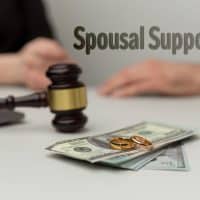What Happens If Your Ex Doesn’t Pay Court-Ordered Maintenance?

As an experienced family law attorney in Schaumburg, I have seen how stressful it can be when an ex-spouse refuses to pay court-ordered maintenance. Spousal maintenance, also known as alimony, is awarded to help one spouse maintain financial stability after a divorce. When these payments are missed or ignored, it can create serious financial hardship and emotional distress. Fortunately, Illinois law provides legal remedies to enforce maintenance orders and hold non-paying spouses accountable.
Understanding Spousal Maintenance In Illinois
Spousal maintenance is governed by 750 ILCS 5/504 of the Illinois Marriage and Dissolution of Marriage Act. Courts may award maintenance based on factors such as the length of the marriage, the income of both parties, the standard of living during the marriage, and each spouse’s future earning potential. Once a court issues a maintenance order, it is legally binding, and both parties must comply with its terms unless it is modified by the court.
Consequences Of Failing To Pay Court-Ordered Maintenance
When an ex-spouse refuses to pay maintenance, they are violating a court order. Under 750 ILCS
5/505(b), the court has the authority to enforce maintenance payments through various legal mechanisms, including:
- Contempt of Court – A judge can hold the non-paying spouse in contempt for willfully disobeying a court order. Penalties can include fines, wage garnishment, and even jail time until payments are made.
- Income Withholding Orders – The court can require an employer to deduct maintenance payments directly from the non-paying spouse’s wages.
- Liens and Seizure of Assets – Courts can place liens on property or seize bank accounts to recover unpaid maintenance.
- Interest on Unpaid Amounts – Illinois law allows interest to accrue on overdue payments, increasing the amount owed.
Non-payment of maintenance is taken seriously in Illinois. Courts expect full compliance with maintenance orders, and repeated violations can lead to severe penalties.
Steps You Can Take If Your Ex Stops Paying
If your ex is not making court-ordered maintenance payments, you have several legal options:
- File A Petition for Rule to Show Cause – This asks the court to require your ex to explain why they have not complied with the order. If the court finds their failure was willful, they can be held in contempt.
- Request Income Withholding – You can ask the court to issue an order requiring the other party’s employer to withhold maintenance payments from wages.
- Seek A Judgment for Arrearages – The court can issue a judgment for the total amount of unpaid maintenance plus interest, which can then be enforced like any other debt.
- Pursue Attorney’s Fees – Under 750 ILCS 5/508(b), you may be able to recover legal fees incurred while enforcing a maintenance order.
Modification Of Maintenance Orders
Sometimes, non-payment occurs because of genuine financial hardship. If your ex has lost their job or experienced a significant change in circumstances, they must petition the court to modify the maintenance order under 750 ILCS 5/510. Until the court approves a change, they remain obligated to make full payments. Failure to do so without a court-approved modification still constitutes a violation of the order.
Frequently Asked Questions About Unpaid Maintenance In Illinois
What Happens If My Ex Refuses To Pay Maintenance?
The court can enforce the order through contempt proceedings, wage garnishment, liens on property, or seizure of assets. Interest may also be added to unpaid amounts, increasing what is owed.
Can My Ex Go To Jail For Not Paying Court-Ordered Maintenance?
Yes. If the court finds that the failure to pay is willful, it can hold your ex in contempt of court and order jail time until payments are made or a compliance plan is established.
What Is A Petition For Rule To Show Cause?
This petition asks the court to compel your ex to explain why they have not complied with the maintenance order. If the court determines the non-payment is intentional, it can impose penalties to enforce payment.
Can I Collect Attorney’s Fees From My Ex For Enforcing Maintenance?
Yes. Under 750 ILCS 5/508(b), the court may order the non-paying party to reimburse your legal fees if you had to go to court to enforce a valid maintenance order.
What If My Ex Claims They Cannot Afford To Pay?
They must petition the court to modify the maintenance order under 750 ILCS 5/510. Until a modification is granted, they remain legally obligated to pay the full amount owed.
How Long Do I Have To Collect Unpaid Maintenance?
Unpaid maintenance becomes a judgment debt, which you can collect for many years. Interest continues to accrue, and courts have wide authority to enforce payment even long after non-payment began.
Can My Ex’s Property Or Assets Be Seized For Non-Payment?
Yes. Courts can place liens on property, seize bank accounts, or intercept tax refunds to recover unpaid maintenance obligations.
Can The Court Suspend My Ex’s Driver’s License For Non-Payment?
In Illinois, judges have the authority to suspend a non-paying ex-spouse’s driver’s license or professional licenses as a penalty for willful failure to pay maintenance obligations.
What If My Ex Moves Out Of State To Avoid Paying?
Illinois courts can enforce maintenance orders across state lines under the Uniform Interstate Family Support Act (750 ILCS 22/101 et seq.). This allows your attorney to work with other states to pursue unpaid maintenance even if your ex relocates.
How to Enforce Court-Ordered Maintenance in Illinois
If your ex refuses to pay court-ordered maintenance, you do not have to face the financial burden alone. At the Law Office of Fedor Kozlov, we help clients throughout Schaumburg and Chicago enforce maintenance orders and protect their rights under Illinois law. We know how to hold non-paying spouses accountable.
Contact our Chicago spousal maintenance attorney at (847) 241-1299 for exceptional legal assistance and to schedule a consultation. We are ready to fight for your financial stability and ensure that court-ordered maintenance is paid in full.
